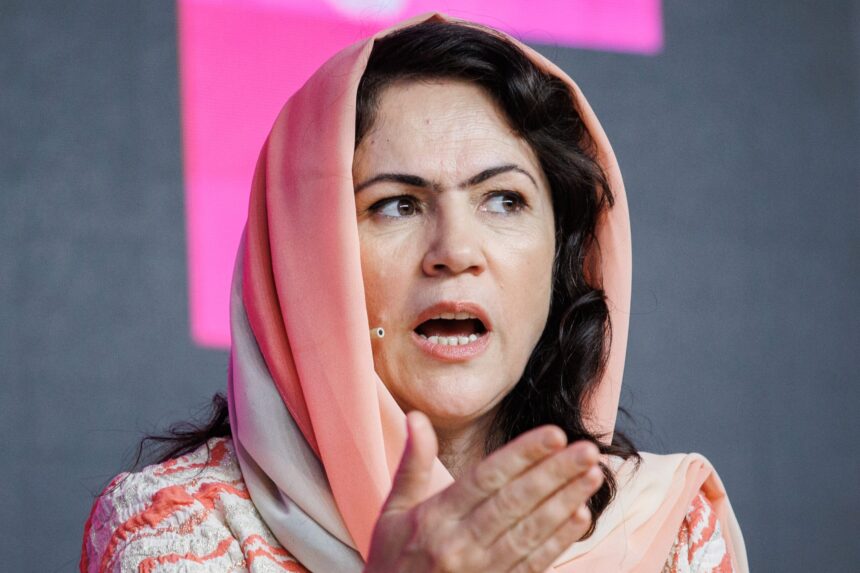RASC News Agency: Former Deputy Speaker of the Afghanistan Parliament, Fawzia Koofi, has accused the Taliban regime of turning the northeastern province of Badakhshan into a laboratory of oppression a region where human dignity, women’s rights, and natural resources are being ruthlessly violated under the guise of governance.
In a sharply worded public statement issued on Monday, Koofi condemned the Taliban’s unrestrained and illegal exploitation of Badakhshan’s gold mines, warning that the group’s extractive policies, driven by greed and tribal favoritism, have already devastated farmlands, displaced families, and inflicted lasting damage on the region’s fragile ecosystem. Sharing distressing images and videos from the mining zones, she wrote:
“In Badakhshan, it is not only the mines that are being looted the very honor and dignity of its people are being crushed under the boots of the Taliban.”
According to Koofi, the Taliban have installed non-local Pashtun commanders from southern provinces to take control of the province’s lucrative mines, while using local Tajik laborers merely as a façade for legitimacy. These commanders, she argued, are looting the region’s wealth to enrich their own factional networks and to secure loyalty among Taliban elites in Kandahar and Helmand.
“The people of Badakhshan have become hostages in their own homeland,” Koofi stated. “They are forced to work in mines that destroy their land, while the profits are smuggled to the Taliban’s southern strongholds.”
Koofi also drew attention to the deteriorating plight of women and girls in Badakhshan, describing their condition as catastrophic. Under the Taliban’s rule, she noted, young girls deprived of education are now being coerced into polygamous marriages with Taliban commanders, a practice she denounced as a flagrant act of gender-based slavery and humiliation.
“The Taliban’s cruelty toward women in Badakhshan is not just social regression it is a crime against humanity,” she wrote, calling on international organizations to document these abuses as part of a broader pattern of systematic oppression.
Her remarks came shortly after reports surfaced of a violent armed confrontation between two rival Taliban factions in Shahr-e-Buzurg district, Badakhshan. According to RASC sources, the conflict erupted between Abdul Rahman Ammar, the former Taliban director of Badakhshan’s mining department, and Shafiqullah Hafizi, the current head of the same office, over the control and profit distribution of a lucrative gold mine. Members of the Taliban’s so-called “Border Battalion” were reportedly dispatched to back Hafizi’s faction, leaving at least one militant dead and several others injured.
Local residents told RASC that the Taliban’s internal feuds have transformed the province into a lawless territory ruled by competing warlords. “These are not ideological disputes,” said one resident. “They are gang fights over stolen gold, fought in the name of Islam but fueled by greed.”
Experts and analysts believe that the Taliban’s internal power struggles in resource-rich regions like Badakhshan expose the moral bankruptcy and tribal fragmentation within the group’s leadership. “The Taliban talk about Islamic governance and economic revival, yet their commanders are acting like organized crime syndicates,” said a Kabul-based political analyst. “They have replaced state institutions with racketeering networks.”
Over the past two years, Badakhshan once admired for its pristine valleys and rich cultural heritage has become a centerpiece of Taliban corruption and environmental destruction. The unregulated mining has led to widespread deforestation, soil erosion, and the contamination of rivers that sustain thousands of rural households.
Environmental experts warn that the consequences of this criminal extraction will endure long after the Taliban’s rule ends. “Every mountain they carve open, every river they poison, is a wound inflicted upon Afghanistan’s future,” said an environmental researcher interviewed by RASC. “Badakhshan’s destruction is the portrait of a regime feeding on its own nation.”
Koofi’s warning is thus more than a political statement it is a moral indictment of a regime that thrives on exploitation and fear. Under Taliban rule, Afghanistan’s natural wealth has become a currency of power, its women a symbol of subjugation, and its people the collateral victims of a failed ideology disguised as religion.






